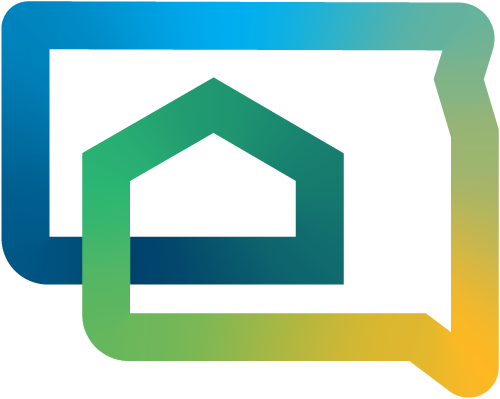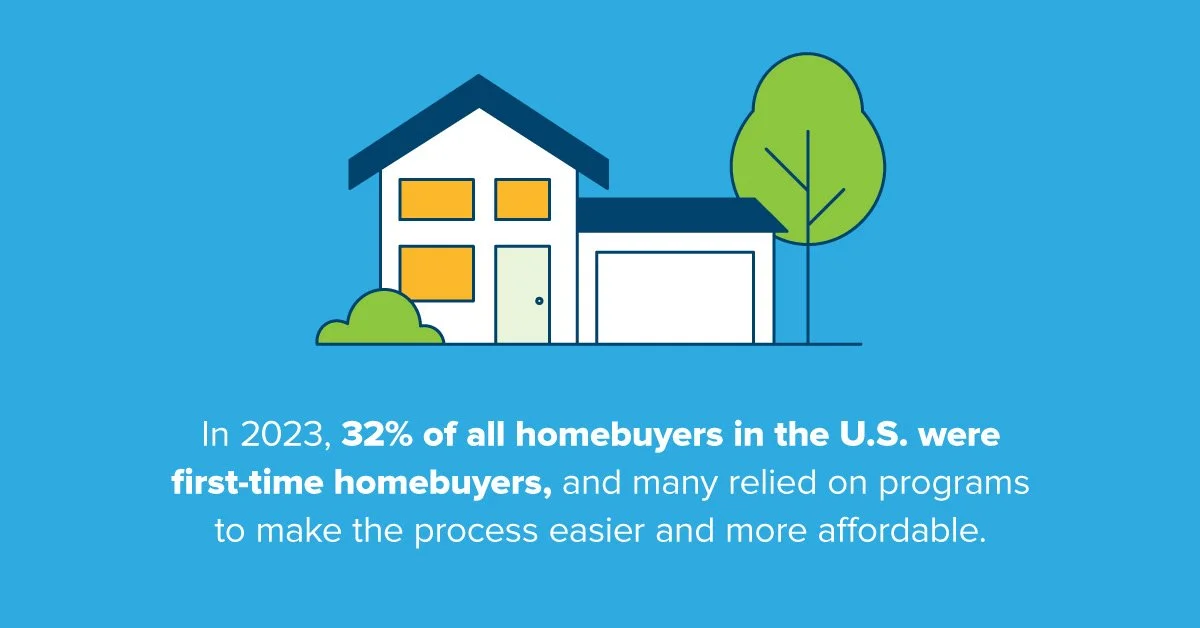How First-Time Homebuyers are Financing
Buying your first home can feel overwhelming, especially when it comes to what you need to know when financing a house. But don’t worry—you’re not alone. Many first-time homebuyers have questions about mortgages, downpayments, credit scores, and loan programs designed to help.
In 2023, 32% of all homebuyers in the U.S. were first-time homebuyers, and many relied on state programs to make the process easier and more affordable. There are options available that can help you get started that are designed for first-time homebuyers.
This guide will help you break down the basics of first-time homebuyer financing. You'll know exactly what to expect starting the process of home financing. With the right information, you’ll be better prepared to buy your first home.
Read our step-by-step guide on what you should know as a first-time homebuyer.
Key Takeaways:
Loan Options for First-Time Buyers: Explore different loans designed specifically for first-time homebuyers, through South Dakota Housing.
Credit Score Considerations: Understand how your credit score impacts your mortgage approval and interest rates, and what steps you can take to improve it.
Income and Eligibility Requirements: Find the income limits and other criteria that can help you qualify for first-time homebuyer programs.
First-Time Homebuyer FAQs: Get answers to common questions, like how much house you can afford, what costs to expect, and what qualifies you for first-time homebuyer programs.
What is a First-Time Homebuyer?
You are a first-time homebuyer if you have not owned a home in the past three years. Some exceptions include:
If a homebuyer owned and lived in a dwelling unit that was not permanently affixed to a permanent foundation (ie; a mobile home), it doesn't count as previous homeownership.
Ask your Participating Lender about our Veterans Waiver to see if you qualify.
Types of First-Time Homebuyer Loans
When it comes to first-time homebuyer financing, there are several loan programs designed to make homeownership more affordable. These loans often offer lower downpayments, better interest rates, and other benefits to help you get started. The most common loans for first-time buyers include:
Conventional Loans: These loans are not backed by the government, but often require a downpayment as low as 3% for first-time homebuyers with good credit.
Federal Housing Administration (FHA) Loans: Backed by the Federal Housing Administration (FHA), these loans allow downpayments as low as 3.5% and have more lenient credit score requirements.
Veterans Affairs (VA) Loans: Available to eligible veterans, active-duty service members, and their families, VA loans offer zero downpayment options and no private mortgage insurance (PMI) requirements.
USDA Loans: Designed for rural homebuyers, USDA loans offer 100% financing and low mortgage rates for eligible low- to moderate-income borrowers.
South Dakota Housing First-Time Homebuyer Programs
South Dakota Housing offers several programs to help homebuyers purchase a home. These programs are designed to make homeownership more available; offering downpayment and closing cost assistance, fixed rates, and support for recent graduates.
First-Time Homebuyer Requirements
To qualify for many first-time homebuyer programs, you’ll need to meet specific criteria. These requirements vary depending on the loan program, but here are some common factors to keep in mind:
Income Limits: Some programs, like USDA loans or downpayment assistance programs, set income limits to ensure they’re helping low- to moderate-income buyers. Your income will be evaluated based on the median income in your area.
Credit Score Requirements: Most loan programs require a minimum credit score. For example, conventional loans typically require a score of at least 620, while FHA loans are more flexible, often approving borrowers with scores as low as 580. Read more on how your credit history can affect your homebuying process.
Debt-to-Income Ratio (DTI): Lenders will calculate your debt-to-income ratio to determine how much of your income goes toward debt payments. Ideally, your DTI should be 43% or lower to qualify for most loan programs, though some lenders may allow higher ratios under certain circumstances.
Homebuyer Education: Many first-time homebuyer programs require you to complete a homebuyer education course. These courses help prepare you for the responsibilities of homeownership and guide you through the buying process. Learn more about our homebuyer education courses.
Meeting these requirements can help open the door to more affordable financing options. If you’re unsure about your eligibility, working with a lender can help clarify the programs you qualify for.
Frequently Asked Questions (FAQ)
As a first-time homebuyer, you may have a lot of questions about the process, financing options, and programs available. Here are some common questions to help you feel more informed as you take the next step toward homeownership.
1. What is a reasonable debt-to-income (DTI) ratio when buying a home?
Most lenders prefer a debt-to-income ratio of 36% or lower. This typically means you have money left over each month and are actively saving some of it. However, some programs may accept ratios as high as 43%, depending on your credit score and financial situation.
2. How much do I need for a downpayment?
The required downpayment varies by loan type. Conventional loans typically require at least 3%, while FHA loans can require as little as 3.5%. Some programs, like VA or USDA loans, offer options with no downpayment required.
3. How can I calculate how much home I can afford?
You can calculate how much home you can afford by evaluating your income, monthly expenses, and savings for a downpayment. Lenders typically recommend that your monthly mortgage payment (including principal, interest, taxes, and insurance) should not exceed 28-30% of your gross monthly income.
Use our mortgage calculator to find out how much home you can afford.
4. What are closing costs, and how much should I expect to pay?
Closing costs are the fees required to finalize your mortgage, including loan origination fees, title insurance, appraisal fees, and more. These typically range from 2-5% of the home’s purchase price. Some of our first-time homebuyer programs offer assistance to cover some of these costs.
5. What questions should I ask my lender when buying a home?
What loan options are available for first-time homebuyers?
What are the interest rates and fees associated with this loan?
Can I get pre-approved for a loan, and how much can I borrow?
Are there any special programs I qualify for (e.g., downpayment assistance, grants)?
What is the timeline for closing, and what documents will I need?
With our guide, you should have the knowledge you need to make an informed decision about your future as a homeowner. Understanding your financial situation, the requirements for a first-time homebuyer, and the available programs offered by South Dakota Housing will bring your dreams that much closer to reality.
Remember, as a first-time homebuyer you’re not alone. Take advantage of the many resources and programs available, and don’t hesitate to reach out to professionals like lenders or real estate agents who can guide you through the process.




